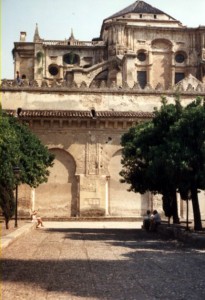… or, haven’t I been to this rodeo before? Why, yes I have, and not all that long ago, either. First I called to mind was poor artless Paula Deen, celebrity cook-book author, metaphorically burned at stake in the marketplace of public opinion. But the Great Duck Dynasty Imbroglio of 2013 reminds me very much more of the Great Chick-Fil-A Ruckus of 2012, wherein some fairly mild published remarks by the CEO of the company sent the usual right-thinking suspects into a frenzy of shrieking like demented howler monkeys. Boycott, shun, divest and/or fire was the general ukase for they are hateful hating bigots who shouldn’t be tolerated by truly tolerant people … and then the funniest thing happened. People went out and deliberately bought lunch, dinner and breakfast at their local Chick-fil-A outlet, to the utter chagrin of the usual right-thinking suspects. Chick-Fil-A nationwide had the best darned week they ever had, as far as sales went, and lines of hungry customers stretching for blocks.
 Sgt. Mom
Sgt. Mom
Archive Post – Very, Very Bad Toys
Ran across this little account of the Very Worst Toys Ever, and began to chortle. (It’s an oft-repeated article, apparently – this version is from earlier this year.) Not so much at the toys themselves, although my brother JP, sister Pippy and I were actually given at least one of the deadly worst and a couple of the others mentioned in subsequent comments.
We, of course, emerged un-maimed, although Dad probably regretted to the end of his days that he didn’t give either one of us the atomic energy lab. Probably couldn’t afford it, as he was only a poor graduate student on the GI bill, round and about the time it was on the market. We did have loving and generous grandparents, though; how we didn’t ever get BB rifles like all the other neighborhood kids is a mystery. Mom probably put her foot down about that, believing that yes, you could put out an eye with them. Well, so could you with a ‘wrist rocket’. We had a pair of them, a sort of bent-metal sling-shot with a bottom end that braced against your wrist so that you could sling a bit of gravel at practically ballistic speeds. But they weren’t toys- we had them to chase the blue jays away from the house where they tormented the cats and dogs unmercifully. As far as I know, Dad was the only one of us who ever actually hit a blue-jay with a wrist-rocket impelled missile. Square in the butt, actually. It let out an enormous squawk and vacated the premises henceforth and forthwith and at a good speed.
Book Review – Breakfast With the Dirt Cult
It was a thing that I noticed over the course of my own military service that generally American youth changed more radically between the age of 18 and 25 than at any other time of their life save that span between infant and kindergartner. Or at least, that portion of it that chooses to join the military does. Such people enlist and trundle off to boot camp and their first duty assignment they are kids; impetuous, ruled by impulse and mad urges to indulge in all kinds of attractive bad things … but somehow over the course of that rocky journey, the largest portion grow into mature, focused and relatively well-adjusted adults. Serious obligations and sometimes life-threatening experiences such as serving at the very pointy end of the spear that is America’s military have that effect.
History Friday – Walking in the Forest of Stone

The ancient building at the heart of Cordova’s old quarter breathed quiet, and the cool dimness of an old-growth forest, that kind of forest where the straight trunks of ancient trees spring from the leaf-mast, moss or bracken fronds at their feet. There is no intermediate brush, no smaller trees clogging the sightlines between the tree trunks, which go on forever in every direction. Shafts of sunshine sometimes find a break in the green canopy overhead, and in the morning, wisps of fog tangle around the tree-trunks like tatters of silk scarf. But there was no early morning fog here, no bracken or grass at our feet, only the ancient floor paving, undulating slightly with twelve hundred years of wear and settlement.
My daughter and I blinked, coming in from the dazzle outside— pillared groves of orange trees in the courtyard outside, under a brilliant blue sky, magenta bougainvillea flaming against whitewash and the rose-honey color of weathered terracotta tiles.
Christmas Cookies

Pecan Angel Slices
(from Joy of Cooking 1975 Edition)
Cream together until well-blended: ½ cup butter and ¼ cup sugar
Beat in well: 1 egg and ½ teasp vanilla
Combine and add to the above: 1 ¼ cup sifted flour and 1/8 teasp salt
Pat dough evenly into a greased 9×12 inch pan and bake at 350 ° for fifteen minutes. Remove from oven.
Combine: 2 beaten eggs, 1 ½ cup brown sugar, ½ cup flaked cocoanut, 1 cup chopped pecans, 2 Tbsp. flour, ½ teasp double acting baking powder, ½ teasp salt and 1 teasp vanilla.
Pour over cookie layer and return to oven for 25 minutes
Combine 1 ½ cup sifted confectioner’s sugar with sufficient lemon juice to make a smooth, runny glaze. Pour over warm cookie/pecan/coconut layer and allow to set.
When cool, cut into bars or squares. Merry Christmas, Happy Holidays … and bon appetite!